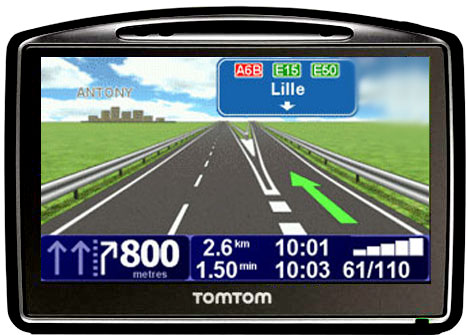 Apple isn’t the only one tracking your location: GPS manufacturing TomTom admitted it has been collecting user data to help police in the Netherlands track down drivers breaking the speed limit. Dutch publication Algemeen Dagblad reports that the devices were monitoring customers speeds and that this information was being sold to law enforcement officials, who would then set up speed traps. It’s become a viable business for TomTom, which has struggled to compete since the introduction and inundation of smartphones featuring GPS applications.
Apple isn’t the only one tracking your location: GPS manufacturing TomTom admitted it has been collecting user data to help police in the Netherlands track down drivers breaking the speed limit. Dutch publication Algemeen Dagblad reports that the devices were monitoring customers speeds and that this information was being sold to law enforcement officials, who would then set up speed traps. It’s become a viable business for TomTom, which has struggled to compete since the introduction and inundation of smartphones featuring GPS applications.
In a statement on the company site, TomTom CEO Harold Goddjin apologized for the privacy violation (you can watch it in video below), while also trying to defend his company’s actions. He claims TomTom believed the cooperation with police could increase road safety, and that the company was unaware up until now that authorities were using the data to place speed traps. Goddjin also says “We are aware a lot of our customers do not like the idea and we will look at if we should allow this type of usage,” and explains users can disable the data collection function. “Our goal is to create a drive community capable of reducing traffic congestion for everyone,” Goddjin says. Funny, we thought TomTom’s goal to was to get users from one place to another, not babysit and consequently tattle on drivers.
It should be understood that the issue here isn’t so much TomTom systems collecting data as the sale of it is. The devices aggregate customers’ driving and traffic conditions in order to provide commute estimates and alternative routes as accurately as possible. There is no surprise that a navigation device is tracking your location – but users did not expect that information to be stored and sold.
While the incident appears, at the moment, to have exclusively affected Dutch drivers, it should definitely make any TomTom GPS users out there wonder. It’s just one more sign that if you have a device that detects your location, you can be nearly 100-percent certain there are ulterior motives for that information. The iPhone, Android devices, and Windows 7 Phones are all grappling with their own location-tracking controversies, and it feels like this is just the beginning. It doesn’t seem terribly crazy to think that many devices that include GPS features could find themselves in a similar situation as TomTom: As the market grows and becomes flooded with new, better, more popular hardware, they may see sales fall. And if or when this happens, companies will have extremely valuable consumer data to fall back on. Consumer data that the TomTom incident has reaffirmed people are willing to pay for. Of course this doesn’t exclusively apply to location, and you can only imagine the wealth of personal information out there that companies would be willing to auction off in a financial crisis.


